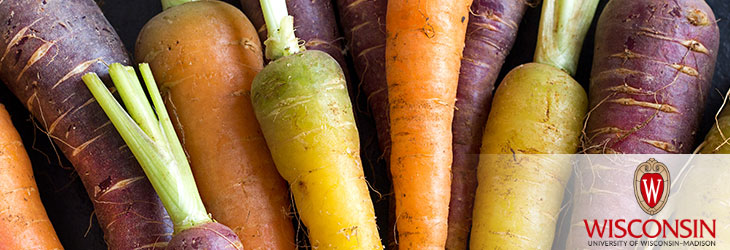Animals, Agriculture & Food

A Method of Modifying Lignin to Improve Biomass Utilization
WARF: P100199US02
Inventors: John Ralph, John Grabber
The Wisconsin Alumni Research Foundation (WARF) is seeking commercial partners interested in developing a method of altering lignin that has the potential to deliver significant improvements in biomass utilization.
Overview
Lignin is a complex, heterogeneous polymer found in all vascular plants. It rigidifies plants and plays a crucial role in water transport.
However, lignins are effectively indigestible and interfere with the ability of ruminants to utilize otherwise digestible carbohydrates in forage; similarly, they preclude efficient conversion of polysaccharides to simple sugars for use in industrial fermentation. Altering lignins to improve the digestibility and fermentability of cell wall polysaccharides could increase the nutritional content of forages and the cost-effectiveness of converting biomass into liquid fuels and other industrial products.
Although not cost-effective for feedstuffs, harsh chemical pretreatments commonly are used in the industrial conversion of fibrous crops into biofuels, chemicals and paper. Processes to render lignin more susceptible to mild pretreatments could reduce production costs as well as the environmental impact of converting fibrous biomass into useful products.
However, lignins are effectively indigestible and interfere with the ability of ruminants to utilize otherwise digestible carbohydrates in forage; similarly, they preclude efficient conversion of polysaccharides to simple sugars for use in industrial fermentation. Altering lignins to improve the digestibility and fermentability of cell wall polysaccharides could increase the nutritional content of forages and the cost-effectiveness of converting biomass into liquid fuels and other industrial products.
Although not cost-effective for feedstuffs, harsh chemical pretreatments commonly are used in the industrial conversion of fibrous crops into biofuels, chemicals and paper. Processes to render lignin more susceptible to mild pretreatments could reduce production costs as well as the environmental impact of converting fibrous biomass into useful products.
The Invention
Wisconsin researchers have developed a method of structurally altering lignin by modifying its monomer complement to allow biomass polysaccharides to be more efficiently and sustainably utilized. The method comprises performing a lignin-producing polymerization reaction in the presence of various gallic acid or flavan-3-ol derivatives. Cell walls containing these modified lignins are inherently more fermentable by rumen microflora and can be more readily delignified by mild pretreatments and enzymatically saccharified to sugars for industrial fermentations.
Applications
- Improved digestion and utilization of animal feeds and forages
- Enhanced conversion of lignocellulosic biomass to biofuels and industrially important chemicals
- Lower cost production of pulp for papermaking
Key Benefits
- Bioengineering alfalfa, one of the most important crops in the U.S., to produce modified lignins could reduce feed energy and protein supplementation costs for the livestock industry by up to $500 million per year.
- Modifying lignin in other forage crops like silage corn could yield additional savings in feed costs.
- Altering lignin improves cell wall saccharification and fermentability (for liquid biofuels production), both before and after mild chemical pretreatments.
- By reducing the severity of the pretreatment step, this discovery should lead to savings in facility and energy costs and water consumption during biomass processing.
- May enable sustainable local processing of biomass, which could decrease transportation costs and reduce greenhouse emissions
- Applicable to all types of plants
Additional Information
For More Information About the Inventors
Tech Fields
For current licensing status, please contact Jennifer Gottwald at [javascript protected email address] or 608-960-9854